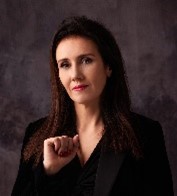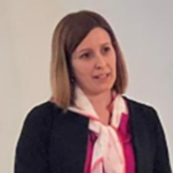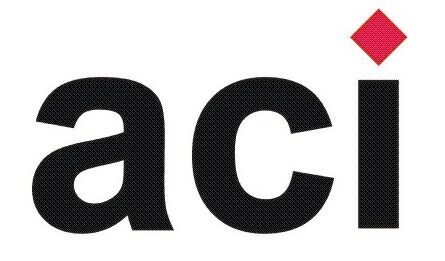The Mini Tracks for ECKM
- Conversational AI within Higher Education Institutions
- Ethics and Human Values in the Knowledge Life Cycle
- How to … Lessons Learned
- Storytelling as an Organisational Knowledge-sharing tool
- Digital technologies for knowledge sharing in the hybrid workplace
- Challenges and Solutions for Sustainable Knowledge Management
- Knowledge Management in Different Cultural Contexts
- Age of Digitalisation
- KM and Practices in Family Firms
- Knowledge Transfer, Exchange and Creation Among Experts with Different Backgrounds
- Advancing Social Innovation
Conversational AI within Higher Education Institutions
 Mini Track Chair: Dr Desireé Cranfield, Swansea University, UK
Mini Track Chair: Dr Desireé Cranfield, Swansea University, UK
The purpose of this mini track is to showcase research that fosters collaboration, innovation, and knowledge sharing in the field of Conversational AI within Higher Education Institutions (HEIs). The track provides a platform to explore the latest innovations and applications of Conversational AI in the context of higher education, including how this technology is reshaping teaching, learning, and administrative processes. Conversational AI has the potential to make education more accessible and inclusive and we hope to promote discussion and best practice for leveraging AI to break down barriers and ensure equitable educational opportunities for all students as well as considering how the technology is empowering educators and administrators to perform their roles more effectively. Ethical concerns are also important and contributions reflecting best practice for responsible AI usage will be welcome.
Conversational AI serves as a hub for global collaboration, bringing together experts, educators, and industry leaders to co-create best practices that will shape the future of AI in higher education, and it can inspire Innovation and Networking
Suggested topics include but are not limited to:
- Innovative Applications: Share insights into pioneering applications of Conversational AI in HEIs, including virtual assistants, chatbots, and AI-driven tutoring systems.
- Enhancing Student Experience: Discuss how Conversational AI can improve student engagement, support, and learning outcomes, fostering a more interactive and personalized educational experience.
- Inclusivity and Accessibility: Explore best practices for ensuring that Conversational AI solutions in HEIs are accessible to all students, including those with disabilities or from underrepresented groups.
- Sustainability and Efficiency: Examine strategies for utilizing Conversational AI to enhance operational efficiency, reduce administrative burden, and promote financial sustainability in HEIs.
- Ethical use of Conversational AI: Explore methods for the ethical use of AI tools within HEI
- Case Studies and Success Stories: Present real-world case studies and success stories that highlight the positive impact of Conversational AI adoption in HEIs.
- Co-creation and Collaboration: Encourage dialogue on collaborative efforts between academia, industry, and technology providers to co-create best practices and shape the future of Conversational AI in higher education.
Ethics and Human Values in the Knowledge Life Cycle
 Mini Track Chair: Prof Ali Hessami, IEEE, UK
Mini Track Chair: Prof Ali Hessami, IEEE, UK
Managing knowledge requires activities and tasks throughout the knowledge life cycle. The traditional knowledge management focus on cost, economic value, process and technology has often missed the consideration of human values, rights and social impact. It is these human values which really makes the management of knowledge such an interesting and complex area of research.
This track is intended to address consideration of ethics and human values in the knowledge life cycle processes, activities and tasks to render ethically aligned products, services and systems. The ideas surrounding this topic are diverse and varied so submissions are welcome from a number of topics
Theoretical, as well as practical contributions, are invited to this mini track. Potential topics include, but are not limited to:
- Ethics considerations in KM and emerging technologies
- Ethical analysis of KM activities
- Ethics aware KM
- Ethical considerations in Knowledge Sharing
- Social impact of KM
- Consideration of human values in KM
How to … Lessons Learned
 Mini Track Chair: Andrew Herd European Space Agency, The Netherlands
Mini Track Chair: Andrew Herd European Space Agency, The Netherlands
Academic investigation and case studies into any new technology or process means implementing effective Lessons Learned, and this has direct and positive implications for the means by which knowledge management is implemented.
Implementation needs to cover aspects of “people, process and technology” and these need to come together to produce simultaneous solutions through the use of innovative and novel means. The key to success with lessons learned is to fully understand and address the interactive influence of these three aspects. As such it is key to providing not only effective processes and cultural interventions but also to applying the appropriate technology.
This track welcomes contributions on applied technologies that address the “people, process and technology” paradigm that is needed for both effective and efficient lessons learned (and also knowledge management).
Suggested topics include but are not limited to:
- Lessons learned through
- “people”
- “process”
- “technology”
- Ways in which technology can be an effective means to implement “total” lessons learned
- Technology addressing people-based needs
- Technology addressing process-based needs
Storytelling as an Organisational Knowledge-sharing tool
 Mini Track Chair: Ludmila Mládková Prague University of Economics and Business, Czech Republic
Mini Track Chair: Ludmila Mládková Prague University of Economics and Business, Czech Republic
Stories are a natural means of human communication. They are complex systems of symbols that give sense to things and events and represent norms, experiences, and reality explanations. They provide message context, bring people together on a common perspective, and provide defensive mechanisms against information from outside. As such, they are catalysts of understanding and trust. Storytelling - or telling stories, is an essential tool for knowledge sharing.
As for individuals or the whole society, stories are vital for organisations, too. We find many different types of stories in every organisation. The style of stories told in an organisation characterises it and reflects its strengths and weaknesses, values, principles and health. Organisational elements such as teams, communities, and departments create their own stories describing their management style, employee relationships, values, problems, usual activities, and lessons learned. Such stories are shared in everyday informal communication and influence all corporate activities, decision making and management styles.
This mini track is looking for contributions that highlight how storytelling has contributed to knowledge sharing in organisations.
Suggested topics include but are not limited to:
- Storytelling and the tool of tacit knowledge sharing in an organisation
- Organisational meta-stories, how they develop and influence the organisation
- Stories of success and failure and their role in an organisation
- Storytelling as a leadership tool
- Storytelling as a method of evaluation of the health of an organisation
Digital technologies for knowledge sharing in the hybrid workplace
 Mini Track Chair: Kathrin Kirchner, Technical University of Denmark
Mini Track Chair: Kathrin Kirchner, Technical University of Denmark
Knowledge sharing can be challenging in a hybrid working environment when knowledge workers work partly at the office and partly at home. Although many companies use video conferencing systems and social media to bridge the gap, not all tools are equally helpful when sharing explicit and tacit knowledge, e.g., during meetings, brainstorming sessions, or training.
This mini-track examines the new digital technologies, including social media, AI-driven knowledge management systems, and virtual reality platforms, to evaluate their impact on knowledge sharing within organizations, educational institutions, and communities adopting hybrid working arrangements. What are the opportunities to use such technologies for knowledge sharing, and what are the challenges and ethical concerns?
This mini-track invites researchers, practitioners, and innovators to contribute their insights, empirical findings, literature reviews, and case studies, promoting a holistic understanding of the impact of new digital technologies on knowledge sharing within the hybrid workplace.
Suggested topics include but are not limited to:
- How can new digital technologies be used in knowledge sharing by hybrid workers?
- How can digital knowledge-sharing tools bridge geographical and cultural gaps?
- What ethical and privacy concerns are associated with sharing knowledge via digital technologies in the hybrid workplace?
- What is the potential of digital technologies to create immersive and engaging learning experiences for remote and hybrid workforces?
- How can tacit knowledge be shared using digital technologies in the hybrid workplace?
Challenges and Solutions for Sustainable Knowledge Management


Mini Track Chair: Luiza Piersiala & Patrycja Krawczyk, Czestochowa University of Technology, Poland
This session considers theoretical and applied research challenges in the area of sustainable knowledge management.
Global economic development based on sustainability is only possible through broadly understood knowledge. The conditions and development of a knowledge-based economy mean that modern organisations must meet many new challenges associated with the need to adapt to changes and transformations occurring in the environment. The effective introduction of new ideas requires the acquisition or supplementing of knowledge in the implementation of these processes, taking into account the specificity of the changes made.
The introduction of innovative management solutions that are based on knowledge can result in a significant improvement in efficiency and effectiveness. Sustainable knowledge management implies an understanding of the social, environmental, and economic aspects, taking into account the costs of current decisions for future generations. We are looking for innovative academic approaches presenting theoretical and empirical research into sustainable knowledge management.
Suggested topics include but are not limited to:
- We are looking for innovative academic approaches presenting theoretical and empirical research into sustainable knowledge management. Topics of interest include (but are not limited to):
- Key challenges of sustainable knowledge management
- Development and evaluation of innovative tools supporting sustainable knowledge management
- Application of AI in knowledge management.
- Good practices of knowledge management.
- Managing Social Innovation; trends, perspectives, and challenges.
- Kowledge management in the context of corporate social responsibility.
Knowledge Management in Different Cultural Contexts
 Mini Track Chair: Liu Gang, Business School, Shenzhen Technology University
Mini Track Chair: Liu Gang, Business School, Shenzhen Technology University
It is widely acknowledged that knowledge management (KM) should consider the differences in national cultures to fit the environment of the focal organizations. National cultures affect the KM activities since national culture can influence every individual’s perception and behaviour. National cultures mirror all people’s thought about knowledge and their behaviour towards knowledge-related activities, such as knowledge acquisition, sharing, creation, application, and protection.
Incorporating the impacts of national culture can further theoretical development and strengthen the inference of cultural effects. Given the distinct institutional differences, variations in KM practices and enablers can be revealed in different countries, which suggests it is worth examining KM in different national cultural contexts.
Suggested topics include but are not limited to:
- KM in multinational companies
- Knowledge transfer across different cultural contexts
- Advanced technologies (e.g., generative artificial intelligence, ChatGPT and blockchain, etc.) facilitate or impede knowledge management in different cultural contexts.
- Impacts of national cultures/ institutions on knowledge managements
- Impacts of social media on customer knowledge management in different countries.
- KM and innovation in different cultural contexts.
Age of Digitalisation
 Mini Track Chair: Nóra Obermayer University of Pannonia, Veszprém, Hungary
Mini Track Chair: Nóra Obermayer University of Pannonia, Veszprém, Hungary
Digitalisation is one of the most important trend in the 21st century, sweeping the world and transforming our everyday activities. There is hardly any industry, organisation that is not affected in some way by digitalisation. Remote working is increasingly becoming the norm in the workplace out of necessity due to Covid-19. However, some employers are not convinced that employees have the discipline to work remotely, effectively and business processes and infrastructure are partly localised and confined to the physical office. In the long term, digitalisation will continue to transform business and society. To be ready to respond to the challenges, companies and organisations need to embrace digitalisation, select the right digital technologies and solutions to improve operational efficiency.
The purpose of the Mini track is to attract research on digitalisation, the use of digital technologies, knowledge and competencies and the challenges of the Industry 4.0/5.0. The Mini track provides a discussion forum for researchers interested theoretical and practical problems related to digitalisation.
Suggested topics include but are not limited to:
- Digital competence and knowledge
- Digital human resource management
- Digital marketing
- Digital competence for the workforces and/or citizens
- Networked workplace and collaborative/social media technologies
KM and Practices in Family Firms



Mini Track Chair: Walter Vesperi,University of Palermo, Italy, Yong Wang, University of Wolverhampton, UK &Anna Maria Melina, University of Messina, Italy
In recent years, scholars and practitioners have recognized knowledge as the most important resource in organizational processes and for this reason an extensive literature on strategic knowledge management (KM) has been consolidated. From this perspective, it becomes vital for the survival and success of organizations to facilitate the creation, storage, transfer and application of knowledge.
There are many studies on KM in family firms and insights concerning businesses in general. Few studies have focused on the transfer and sharing of knowledge between different generations. The purpose of this mini-track is to deepen the aspects and concepts of knowledge management in family firms. Theoretical, as well as practical contributions, are invited to this virtual mini track.
Potential topics include, but are not limited to:
- New trends in Knowledge Management Practices in Family Firms
- Knowledge transfer and knowledge translation dynamics in family and no-family firms
- Strategies, approaches, tactics and mechanism for generational succession
- Failures and success stories in KM in Family Firms
The best papers presented will be selected for quick review in the International Journal of Management Practice (IJMP, Inderscience). https://www.inderscience.com/jhome.php?jcode=ijmp
Knowledge Transfer, Exchange and Creation Among Experts with Different Backgrounds
 Mini Track Chair: Yayoi Hirose, Toyo University, Japan
Mini Track Chair: Yayoi Hirose, Toyo University, Japan
A number of business surveys suggest that many CEOs in global companies are now greatly concerned with strategic alliances, and the number of global alliances have been increasing. They need more collaborative partnerships between various areas of expertise to reach win-win business results. Progress in Digital Transformation (DX) is accelerating alliances among experts, and creating a digital business strategy with competitive advantage by transforming relationships among customers, partners, suppliers, and employees.
To create a new business strategy through a strategic alliance, it is necessary to have a perspective on knowledge transfer, exchange, and creation based on a mutual understanding of the experts’ background.
This track aims to discuss how to transfer, exchange, and creation of new knowledge among different experts can generate new business. The discussion covers a wide range of topics, from how to generate new knowledge to how to develop new human resources who can exchange and create new business knowledge by collaborating with experts.
Many companies are suffering from a silo-organizational culture and generating conflict among their various departments, including engineering, marketing, legal, and strategic. The discussion of this track is expected to help solve this problem:
Knowledge transfer, exchange and creation among different backgrounds of individuals:
- Based on adult learning perspective
- Based on educational perspective
- Considering the cultural gaps
- Through dialogue or discussion
Advancing Social Innovation
 Mini Track Chair: Beáta Fehérvölgyi, University of Pannonia, Veszprém, Hungary
Mini Track Chair: Beáta Fehérvölgyi, University of Pannonia, Veszprém, Hungary
In this day and age, innovation is a buzz word and everyone feels the effects, due to modern technologies, new solutions or improved processes. However creating innovation is a complex task and requires sustainable, long term planning in order to meet the needs of the current and future generation. Therefore social innovation is a vital task of the for-profit and non-profit organizations, which requires to take into consideration the necessity of the society, to focus on the locally occurring problems, the environmental possibilities and monitor the global phenomenon.
In this multifaceted process, there are different barriers and supporting factors from the existing organisational culture, the role of the leader, the differences among the collaborating partners, and the available competencies to the legal, financial and economical aspects. Consequently, advancing social innovation is an essential but complicated duty.
Therefore, the purpose of the social innovation mini track to attract theoretical and practical research areas, to gain knowledge, to create place for active discussion, to foster collaboration and support the development of social innovation solutions.
Suggested topics include but are not limited to:
- The impact of social innovation
- The role of knowledge management in social innovation processes
- Innovation competencies for sustainable social solution
- Sustaining an innovative organizational culture

